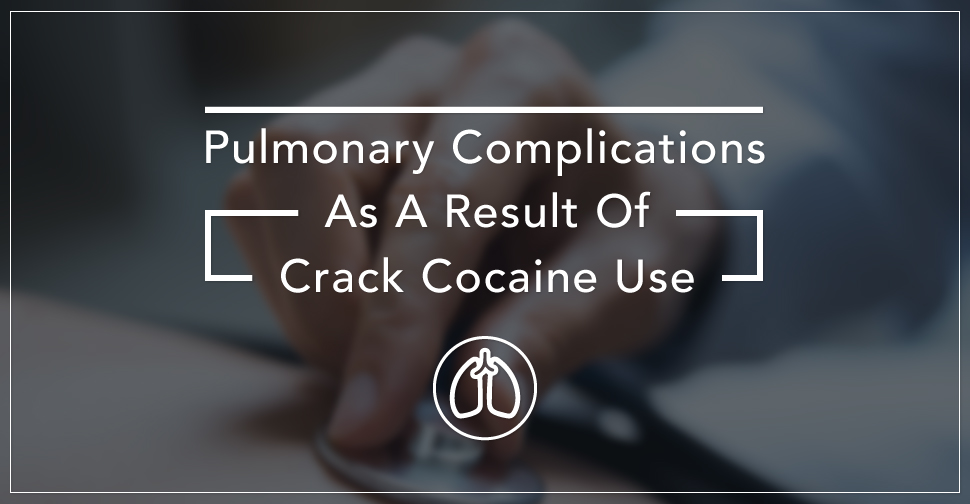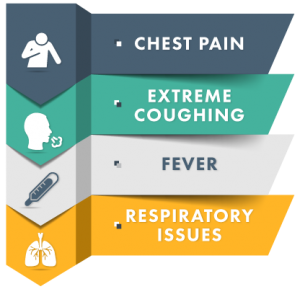
Since it was first developed in the 1970s, crack cocaine has gained popularity for recreational use. This increased use may be due largely to its greater availability. Because crack is a synthetic blend of cocaine, it is often easier to obtain. Also, crack is easy for people to manufacture and to purchase. Unfortunately, it can be highly addictive for persons abusing it and can cause extreme short- and long-term effects from prolonged use, including a variety of serious pulmonary concerns. Your pulmonary system is a system of blood vessels, including veins and arteries, that are responsible for circulating oxygen between the heart and lungs.
Crack Cocaine Defined
Cocaine is typically a white powder. Crack cocaine (or freebase cocaine) lends its name from the crackling sound it makes when smoked. This form has been processed into a crystallized solid. In this state, it can be smoked in a pipe, called a crack pipe. When the rock solid is heated in the pipe, vapors are released which are then inhaled. People suffering from addiction may take several consecutive doses, or “hits” to ensure a continued high.

As explained by the National Institute on Drug Abuse (NIDA), cocaine affects a chemical called dopamine which is released in the reward circuit of the brain. Dopamine typically contributes to the reward, or pleasure feelings in the brain. When a person experiences pleasure, dopamine is released then recycled. Crack cocaine does not allow for dopamine to re-enter the brain, but instead forces the continued release of it. This build-up between the nerve cells is what causes the “high” experienced by people who use this drug.
What Are The Effects Of Crack Cocaine?
Smoking crack may be even more dangerous than taking other forms of cocaine because breathing it into the lungs allows an immediate high. Inhaling the vapors ensures the drug will reach the brain without delay. This also means the high will be very intense. Crack holds a bigger risk for addiction than various other substances, as smoking can increase the potential for addiction.
There are numerous adverse effects caused by crack cocaine abuse. To begin, crack may change a person’s mental faculties, producing a sense of extreme happiness or a false sense of mental alertness. Crack may also make a person overly sensitive to sight, sound, and touch. People taking it may become irritable or paranoid. During the high period, however, people using crack may experience mild to moderate physical effects, such as:
- A sense of restlessness
- Increased body temperature
- Increased heartbeat
- Nausea
- Pupil dilation
- Tremors or muscle twitches
Crack may be particularly harmful to the sinuses and can cause nasal perforation, in extreme cases, it may even result in a deviated septum. In addition to the complications with smelling, swallowing, frequent nose bleeds, and the constant runny nose which may occur due to continued use of crack, the lungs and pulmonary system may suffer further damage.
Are you or a loved one suffering from addiction?
Don't wait, get the best treatment options today
Call Now: (833) 473-4227Crack Lung Symptoms
Prolonged crack abuse and addiction may also result in severe lung problems. Repeated inhalations of this drug causes a number of pulmonary conditions, including respiratory problems, which are collectively called crack lung.
 When a person smokes crack, their lungs may become irritated and inflamed. Continuing this pattern of use and abuse may cause permanent damage to the lungs. Further, the chemicals taken directly into the lungs can be harmful, some of which are additives or contaminants. Additives are the substances added to crack cocaine, often to increase the drug’s volume and profits, or to aid in changing the chemical composition.
When a person smokes crack, their lungs may become irritated and inflamed. Continuing this pattern of use and abuse may cause permanent damage to the lungs. Further, the chemicals taken directly into the lungs can be harmful, some of which are additives or contaminants. Additives are the substances added to crack cocaine, often to increase the drug’s volume and profits, or to aid in changing the chemical composition.
In regards to symptoms, crack lung resembles pneumonia. For example, a person with crack lung may display symptoms very close to those of pneumonia, such as:
- Chest pain
- Extreme coughing
- Fever
- Trouble breathing/ respiratory issues
Some people may experience such severe damage, that they spit up blood, whether red or black in color. Serious cases may also result in lung failure. In short terms, this means that the person’s lungs would have trouble getting oxygen to their blood. Left untreated, lung damage could cause further complications in the body, including organ damage, or even death.
Other Pulmonary Complications
Smoking crack cocaine can cause a host of other pulmonary concerns, as outlined by research presented by the Radiological Society of North America (RSNA) and Yale University. Again, many of these issues are attributed to the other chemical adulterants, termed associated substances, that may be mixed within the crack cocaine.
In example, crack cocaine users may experience thermal airway injury, or injury to your airways (the trachea, bronchi, and bronchioles). The Yale publication attributes this to either the presence of these chemical byproducts, or the combustion of residual ether that is left over from the manufacturing of this drug.
Those users who have a history of asthma have specific concerns, as smoking crack has been shown to aggravate this condition, even to the point of respiratory failure that required hospitalization and ventilation.
The RSNA paper tells us that smoking crack cocaine may cause various forms of pneumonia, including organized and aspiration pneumonia. It may also cause pulmonary hypertension and pulmonary edema, or excess fluid in the lungs. Certain other complications such as pulmonary hemorrhage, may prove fatal. This complication creates massive bleeding which often requires surgical intervention.
In some cases of crack lung, a condition called pulmonary eosinophilia is present, which results from an excess of a certain type of white blood cell called eosinophils that cause an inflammation within a person’s lungs. This condition has been shown to respond favorably to steroid treatments.
Lastly, as reported by the RSNA, smoking crack can impair your immune system, due to the fact it “alters alveolar macrophage function and cytokine production.” In short, this means that certain cells (alveolar macrophages) within your lungs that are responsible for defending your respiratory tract are compromised. Because of this, your body has a reduced ability to inhibit the growth of tumor cells, thus increasing the risk of cancer. Beyond this, your body cannot fully utilize nitric oxide, a naturally occurring antibacterial agent, to kill various bacteria, exposing your body to a greater risk of various infectious diseases, including AIDS.
Research also supports the theory that crack cocaine users are at a higher risk for contracting tuberculosis (TB), an infectious disease of the lungs which may prove serious, in the capacity that it can spread to other areas of your body, including your brain, and also become fatal if left untreated. This infection is attributed in large part to a person’s depleted immune system caused by the poor alveolar macrophage functioning that we noted above.
How To Treat Crack Cocaine Addiction
As previously mentioned, crack cocaine is possibly the most addictive form of cocaine. Treating crack abuse or addiction is imperative due to the numerous effects it can have on a person’s health. There are treatment methods available, but medication is not one of them. As NIDA explains, no medications are currently approved for use in treating crack cocaine addiction. Though several medications have been tested in treating crack, like disulfiram, none have been approved by the FDA for manufacture.

Instead, treatment may combine other methods, offered within an inpatient or outpatient program, including, as suggested by NIDA, contingency management and cognitive behavioral therapy (CBT). CBT works to help persons in recovery to build new lifestyle habits free from addiction. CBT essentially promotes long-term abstinence by fostering a discovery of life without substance abuse.
People in recovery from addiction may also find that joining a support group may be helpful. These groups allow a person the opportunity to share their feelings and thoughts. This support will also help an individual to cope, and grant them accountability—all key components to a full recovery.
How To Break The Chain Of Crack Cocaine Addiction
Hundreds of thousands of people abuse crack cocaine every year in the United States. It’s important to remember that many negative side effects can result from addiction to crack, some as severe as crack lung.
 If you or someone close to you has tried crack, or if you are currently struggling with crack abuse or addiction, you do not have to suffer in silence. You can find help for recovery. Contact us today at DrugRehab.org to find more ways you can be connected to resources. You can speak to professionals who know how to help and want to listen. We will help create a plan for your recovery that addresses your specific needs.
If you or someone close to you has tried crack, or if you are currently struggling with crack abuse or addiction, you do not have to suffer in silence. You can find help for recovery. Contact us today at DrugRehab.org to find more ways you can be connected to resources. You can speak to professionals who know how to help and want to listen. We will help create a plan for your recovery that addresses your specific needs.
Sources
Center For Substance Abuse Research — Crack Cocaine

